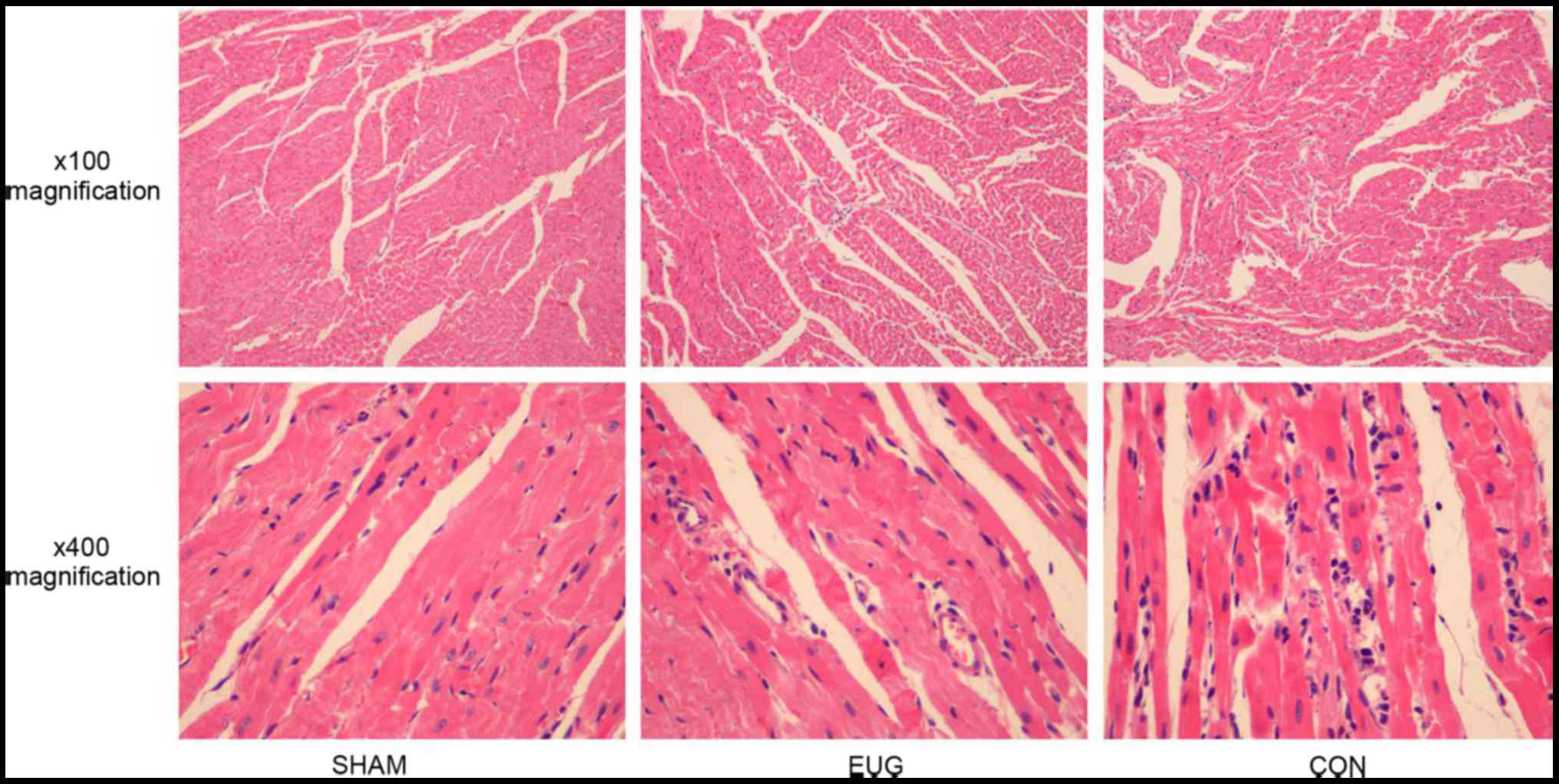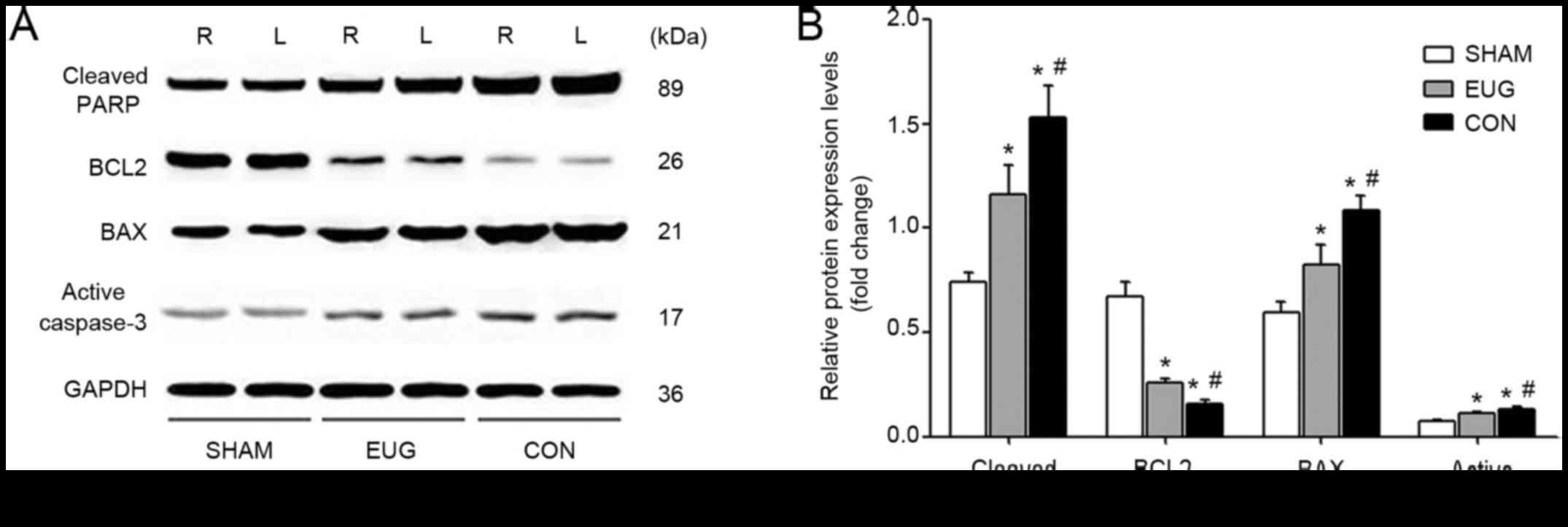|
1
|
Wang W, Hu SS, Kong LZ, Gao RL, Zhu ML,
Wang WY, Wu ZS, Chen WW, Yang JG, Ma LY, et al: Summary of report
on cardiovascular diseases in China, 2012. Biomed Environ Sci.
27:552–558. 2014.PubMed/NCBI
|
|
2
|
Singh TP, Milliren CE, Almond CS and
Graham D: Survival benefit from transplantation in patients listed
for heart transplantation in the United States. J Am Coll Cardiol.
63:1169–1178. 2014. View Article : Google Scholar : PubMed/NCBI
|
|
3
|
Wang H, Zhang X, Zheng X, Lan Z, Shi J,
Jiang J, Zwiep T, Li Q, Quan D, Zhang ZX and Min W: Prevention of
allograft rejection in heart transplantation through concurrent
gene silencing of TLR and Kinase signaling pathways. Sci Rep.
6:338692016. View Article : Google Scholar : PubMed/NCBI
|
|
4
|
Gu H, Xie M, Xu L, Zheng X, Yang Y and Lv
X: The protective role of interleukin-18 binding protein in a
murine model of cardiac ischemia/reperfusion injury. Transpl Int.
28:1436–1444. 2015. View Article : Google Scholar : PubMed/NCBI
|
|
5
|
Tonsho M, Michel S, Ahmed Z, Alessandrini
A and Madsen JC: Heart transplantation: Challenges facing the
field. Cold Spring Harb Perspect Med. 4:a0156362014. View Article : Google Scholar : PubMed/NCBI
|
|
6
|
Luciani GB, Forni A, Rigatelli G,
Chiominto B, Cardaioli P, Mazzucco A and Faggian G: Myocardial
protection in heart transplantation using blood cardioplegia:
12-year outcome of a prospective randomized trial. J Heart Lung
Transplant. 30:29–36. 2011. View Article : Google Scholar : PubMed/NCBI
|
|
7
|
Wood KJ and Goto R: Mechanisms of
rejection: Current perspectives. Transplantation. 93:1–10. 2012.
View Article : Google Scholar : PubMed/NCBI
|
|
8
|
Pramod K, Ansari SH and Ali J: Eugenol: A
natural compound with versatile pharmacological actions. Nat Prod
Commun. 5:1999–2006. 2010.PubMed/NCBI
|
|
9
|
Markowitz K, Moynihan M, Liu M and Kim S:
Biologic properties of eugenol and zinc oxide-eugenol. A clinically
oriented review. Oral Surg Oral Med Oral Pathol. 73:729–737. 1992.
View Article : Google Scholar : PubMed/NCBI
|
|
10
|
Pisano M, Pagnan G, Loi M, Mura ME,
Tilocca MG, Palmieri G, Fabbri D, Dettori MA, Delogu G, Ponzoni M
and Rozzo C: Antiproliferative and pro-apoptotic activity of
eugenol-related biphenyls on malignant melanoma cells. Mol Cancer.
6:82007. View Article : Google Scholar : PubMed/NCBI
|
|
11
|
Mnafgui K, Kaanich F, Derbali A, Hamden K,
Derbali F, Slama S, Allouche N and Elfeki A: Inhibition of key
enzymes related to diabetes and hypertension by Eugenol in vitro
and in alloxan-induced diabetic rats. Arch Physiol Biochem.
119:225–233. 2013. View Article : Google Scholar : PubMed/NCBI
|
|
12
|
Srinivasan S, Sathish G, Jayanthi M,
Muthukumaran J, Muruganathan U and Ramachandran V: Ameliorating
effect of eugenol on hyperglycemia by attenuating the key enzymes
of glucose metabolism in streptozotocin-induced diabetic rats. Mol
Cell Biochem. 385:159–168. 2014. View Article : Google Scholar : PubMed/NCBI
|
|
13
|
Nam H and Kim MM: Eugenol with antioxidant
activity inhibits MMP-9 related to metastasis in human fibrosarcoma
cells. Food Chem Toxicol. 55:106–112. 2013. View Article : Google Scholar : PubMed/NCBI
|
|
14
|
Peixotoneves D, Lealcardoso JH and Jaggar
JH: Eugenol dilates rat cerebral arteries by inhibiting smooth
musclecell voltage-dependent calcium channels. J Cardiovasc
Pharmacol. 64:401–406. 2014. View Article : Google Scholar : PubMed/NCBI
|
|
15
|
Yogalakshmi B, Viswanathan P and Anuradha
CV: Investigation of antioxidant, anti-inflammatory and
DNA-protective properties of eugenol in thioacetamide-induced liver
injury in rats. Toxicology. 268:204–212. 2010. View Article : Google Scholar : PubMed/NCBI
|
|
16
|
Mnafgui K, Hajji R, Derbali F, Gammoudi A,
Khabbabi G, Ellefi H, Allouche N, Kadri A and Gharsallah N:
Anti-inflammatory, antithrombotic and cardiac remodeling preventive
effects of eugenol in isoproterenol-induced myocardial infarction
in wistar rat. Cardiovasc Toxicol. 16:336–344. 2016. View Article : Google Scholar : PubMed/NCBI
|
|
17
|
Motteleb DM, Abd El, Selim SA and Mohamed
AM: Differential effects of eugenol against hepatic inflammation
and overall damage induced by ischemia/re-perfusion injury. J
Immunotoxicol. 11:238–245. 2014. View Article : Google Scholar : PubMed/NCBI
|
|
18
|
Chen H, Xia Y, Zhu B, Hu X, Xu S, Chen L,
Papadimos TJ, Wang W, Wang Q and Xu X: Measurement of the efficacy
of 2% lipid in reversing bupivacaine- induced asystole in isolated
rat hearts. BMC Anesthesiol. 14:602014. View Article : Google Scholar : PubMed/NCBI
|
|
19
|
Gherardini G, Haegerstrand A, Matarasso A,
Gurlek A, Evans GR and Lundeberg T: Cell adhesion and short-term
patency in human endothelium preseeded 1.5-mm
polytetrafluoroethylene vascular grafts: An experimental study.
Plast Reconstr Surg. 99:472–478. 1997. View Article : Google Scholar : PubMed/NCBI
|
|
20
|
Ono K and Lindsey ES: Improved technique
of heart transplantation in rats. J Thorac Cardiovasc Surg.
57:225–229. 1969.PubMed/NCBI
|
|
21
|
Wakayama K, Fukai M, Yamashita K, Kimura
T, Hirokata G, Shibasaki S, Fukumori D, Haga S, Sugawara M, Suzuki
T, et al: Successful transplantation of rat hearts subjected to
extended cold preservation with a novel preservation solution.
Transpl Int. 25:696–706. 2012. View Article : Google Scholar : PubMed/NCBI
|
|
22
|
Croal BL, Hillis GS, Gibson PH, Fazal MT,
El-Shafei H, Gibson G, Jeffrey RR, Buchan KG, West D and
Cuthbertson BH: Relationship between postoperative cardiac troponin
i levels and outcome of cardiac surgery. Circulation.
114:1468–1475. 2007. View Article : Google Scholar
|
|
23
|
Yuan Z, Li H, Qi Q, Gong W, Qian C, Dong
R, Zang Y, Li J, Zhou M, Cai J, et al: Plasma levels of growth
differentiation factor-15 are associated with myocardial injury in
patients undergoing off-pump coronary artery bypass grafting. Sci
Rep. 6:282212016. View Article : Google Scholar : PubMed/NCBI
|
|
24
|
Lee S, Huang CS, Kawamura T, Shigemura N,
Billiar TR, Nakao A and Toyoda Y:
Histidine-tryptophan-ketoglutarate or celsior: Which is more
suitable for cold preservation for cardiac grafts from older
donors? Ann Thorac Surg. 91:755–763. 2011. View Article : Google Scholar : PubMed/NCBI
|
|
25
|
Rittoo D, Jones A, Lecky B and Neithercut
D: Elevation of cardiac troponin T, but not cardiac troponin I, in
patients with neuromuscular diseases: Implications for the
diagnosis of myocardial infarction. J Am Coll Cardiol.
63:2411–2420. 2014. View Article : Google Scholar : PubMed/NCBI
|
|
26
|
Kuang J, Sun Y, Wang W, Ke H and Ye H:
Myocardial apoptosis and injury of donor hearts kept in completely
beating status with normothermic blood perfusion for transplants.
Int J Clin Exp Med. 8:5767–5773. 2015.PubMed/NCBI
|
|
27
|
Li Z, Galli U, Becker LE, Bruns H,
Nickkolgh A, Hoffmann K, Karck M and Schemmer P: Sulforaphane
protects hearts from early injury after experimental
transplantation. Ann Transplant. 18:558–566. 2013. View Article : Google Scholar : PubMed/NCBI
|
|
28
|
Alamran FF and Shahkolahi M: Oxytocin
ameliorates the immediate myocardial injury in heart transplant
through down regulation of the neutrophil dependent myocardial
apoptosis. Transplant Proc. 45:2506–2512. 2013. View Article : Google Scholar : PubMed/NCBI
|
|
29
|
Yamauchitakihara K, Ihara Y, Ogata A,
Yoshizaki K, Azuma J and Kishimoto T: Hypoxic stress induces
cardiac myocyte-derived interleukin-6. Circulation. 91:1520–1524.
1995. View Article : Google Scholar : PubMed/NCBI
|
|
30
|
Liu Q, Li J, Jubair S, Wang D, Luo Y, Fan
D and Janicki JS: Sparstolonin B attenuates hypoxia-induced
apoptosis, necrosis and inflammation in cultured rat left
ventricular tissue slices. Cardiovasc Drugs Ther. 28:433–439. 2014.
View Article : Google Scholar : PubMed/NCBI
|
|
31
|
Kaczorowski DJ, Nakao A, Mollen KP,
Vallabhaneni R, Sugimoto R, Kohmoto J, Tobita K, Zuckerbraun BS,
McCurry KR, Murase N and Billiar TR: Toll-like receptor 4 mediates
the early inflammatory response after cold ischemia/reperfusion.
Transplantation. 84:1279–1287. 2007. View Article : Google Scholar : PubMed/NCBI
|
|
32
|
Reil JC, Gilles S, Zahler S, Brandl A,
Drexler H, Hültner L, Matrisian LM, Welsch U and Becker BF:
Insights from knock-out models concerning postischemic release of
TNFalpha from isolated mouse hearts. J Mol Cell Cardiol.
42:133–141. 2007. View Article : Google Scholar : PubMed/NCBI
|
|
33
|
Carden DL and Granger DN: Pathophysiology
of ischaemia-reperfusion injury. J Pathol. 190:255–266. 2000.
View Article : Google Scholar : PubMed/NCBI
|
|
34
|
Itoh S, Kimura N, Axtell RC, Velotta JB,
Gong Y, Wang X, Kajiwara N, Nambu A, Shimura E, Adachi H, et al:
Interleukin-17 accelerates allograft rejection by suppressing
regulatory T cell expansion. Circulation. 124 11 Suppl:S187–S196.
2011. View Article : Google Scholar : PubMed/NCBI
|
|
35
|
Sang HL, Lee S, Noda K, Kawamura T, Tanaka
Y, Shigemura N, Nakao A and Toyoda Y: Adenosine injection prior to
cardioplegia enhances preservation of senescent hearts in rat
heterotopic heart transplantation. Eur J Cardiothorac Surg.
43:1202–1208. 2013. View Article : Google Scholar : PubMed/NCBI
|


















